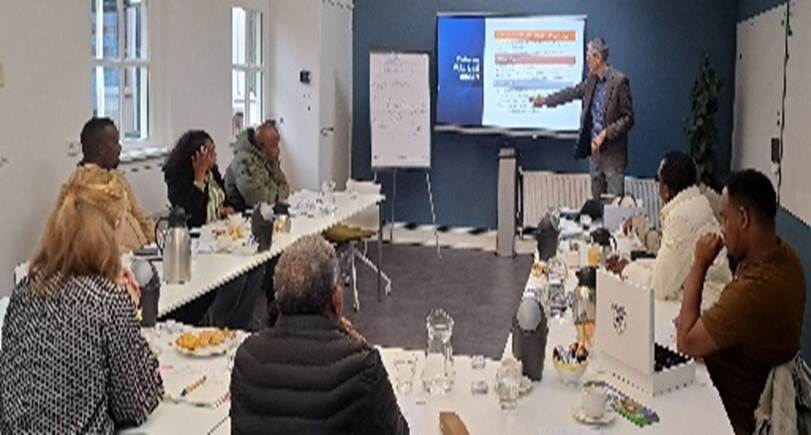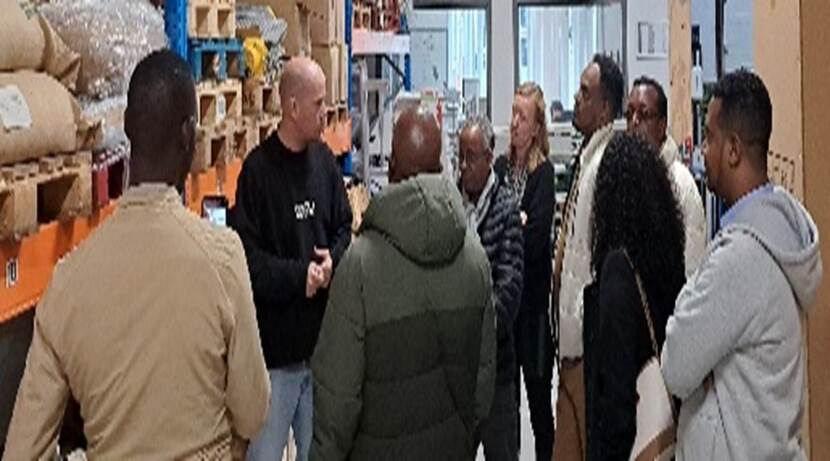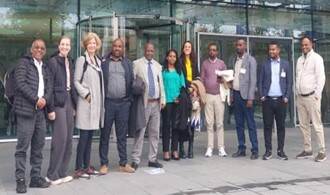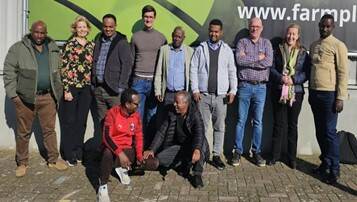Ethiopian Delegates Study Tour to the Netherlands
Building on the success of previous study tours, Agriterra organized its fifth study tour to the Netherlands from 20-27 October 2024. The tour included eight participants representing cooperatives, Oromia Coffee Farmers’ Cooperative Union (OCFCU), Oromia Agricultural Cooperative Federation (OACF), government stakeholders such as the Ethiopian Cooperative Commission (ECC), Oromia Cooperative Promotion Agency (OCPA), Addis Ababa Cooperative Commission (AACC), the Cooperative Bank of Oromia (CBO), and Agriterra Ethiopia.

Fully financed by CBO, the study tour aimed to draw lessons from the best practices of Dutch cooperatives, focusing on apex cooperatives and their roles in lobby and advocacy, market linkage facilitation, and access to finance. The overarching goal was to enhance cooperative development in Ethiopia, influence policymakers, and highlight the value of fostering strategic partnerships between the Netherlands and Ethiopia to improve trade and agricultural cooperation. Additionally, the tour sought to strengthen ties between OCFCU, OACF, and CBO by facilitating experience-sharing with coffee off-takers, fertilizer producers and Rabobank.
The Ethiopian delegates visited nine different companies in the Netherlands
On the first day of their visit, the delegates went to the Dutch Council for Cooperatives (NCR), the highest authority for Dutch cooperatives, on Monday, October 21, 2024. They discovered that the nation boasts a liberalized cooperative structure with 25 million members, and that cooperatives account for about 18% of GDP. The connection between cooperatives and their apex organizations is notably strong. The Board of Directors (BOD) is a hybrid structure comprising cooperative members and experts from relevant industries, with BOD members receiving compensation to maximize their contributions.
Following the NCR visit, the delegates went to the Wageningen University and gain insights into the success factors and history of agricultural cooperatives in the Netherlands including institutional roles, cooperative legislation, member control, pragmatic structures and value chain strategies among others.
The delegates paid a visit to Wakuli, their third company where they discovered the company's emphasis on smallholder farmers (SHF), ensuring fair profit sharing, and the importance of coffee quality and documentation as critical factors for success. Wakuli emphasized that in order to guarantee traceability, give insight into the coffee's path from farm to cup, and meet EUDR compliance requirements, digitizing the value chain is crucial. The company focuses on connecting producer cooperatives to international buyers. However, it noted that cooperatives, unions, and traders in Ethiopia tend to prioritize sourcing while often neglecting other critical aspects of the value chain.

On the morning of 22 October 2024, the delegates visited the Ministry of Foreign Affairs (MFA) in The Hague, where they discussed high-level macro issues aimed at strengthening bilateral ties between Ethiopia and the Netherlands. Key topics included food security and nutrition, with a focus on climate-related challenges. The Ethiopian government’s initiatives, such as the wheat production program and the Green Legacy campaign, were highlighted. Opportunities for collaboration were also identified, particularly in market linkages for agricultural produce, such as cold chain storage for horticulture. In the afternoon, the delegates visited LTO (the Dutch Agricultural and Horticultural Organization) and discussed its policy advocacy work. LTO represents 60% of Dutch professional farmers across all sectors. The delegates gained valuable insights into LTO’s objective of creating a favorable business climate for agrarians in the Netherlands and Europe, as well as its scope of work related to climate, energy, water quality, nature, and landscape.
On the third day of the visit, the delegates visited Rabobank in the morning. They explored the bank’s history and exchanged ideas on strengthening the ACORN project, particularly enhancing its partnership with the Cooperative Bank of Oromia (CBO) to achieve greater impact. Discussions also addressed aligning ACORN with European Union Deforestation Regulation (EUDR) standards to ensure compliance. In the afternoon, the delegates visited a dairy farm, where they observed advancements in farm digitalization, early planning for animal feed preparation, and initiatives aimed at establishing an energy-neutral farm.

The delegates visited CZAV/FARMPLUS on the fourth day and learnt about FARMPLUS's cooperative structure, including the function of the Members' Council, which speaks for its members, and the creation of a Youth Council to deal with matters pertaining to young people. Additionally, they learned about the development of a new governance model following the merger. In the afternoon, the delegates visited Cosun, where they explored its history, governance structure, and key operational insights.

Take aways:
- Incorporate experts into the board of cooperative unions to strengthen board decision-making.
- Specialization and mergers are key drivers for cooperative development.
- OCFCU’s OneKOO priority should focus on developing the local market.
- Organize an annual international coffee expo to connect cooperatives with international buyers.
- Digitize the coffee value chain to improve traceability and efficiency.
- Mapping development partners is crucial to enhance collaboration and maximize impact.
- Forming leagues is essential for ensuring the sustainability of lobby and advocacy efforts.
- Strengthen collaboration between CBO, Rabobank, OCFCU, and Agriterra for the successful implementation of the ACORN project.
- Digitize the value chain, provide value chain financing, and create visibility for all value chain actors.
- Foster continuous learning and education while creating an enabling environment through a legal framework review.
- Explore and implement diverse governance structures for cooperatives.
- Enhance member value by offering competitive pricing through cooperatives.
Finally, the delegates formulated SMART actionable items and presented them to the Agriterra HQ staff in Arnhem on Friday, 25 October 2024.
Some of the key action points included:
- Formation of leagues to strengthen cooperative networks.
- Strengthening and merging Primary Cooperatives (PCs) to create model cooperatives.
- Reviewing regulations and proclamation to create an enabling environment
- Inclusion of external experts in the selected cooperative unions Boards of Directors (BOD).
- Enhancing market linkages:
- Producer Organizations (POs) with 11 consumer cooperatives in Addis Ababa.
- OACF with CZAV and other Dutch buyers.
- OCFCU with Dutch coffee buyers.
- Digitizing cooperatives and smallholder farmers (SHFs) across the value chain while offering input/output financing through initiatives such as:
- ACORN implementation
- Digital F&A banking
- FarmPass
- SACCO link integration.